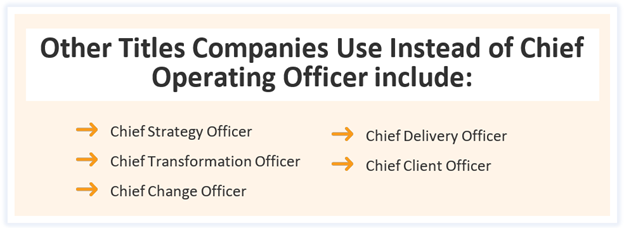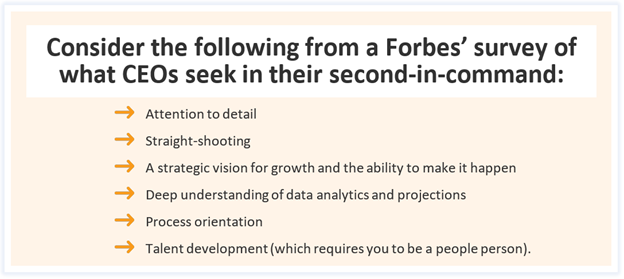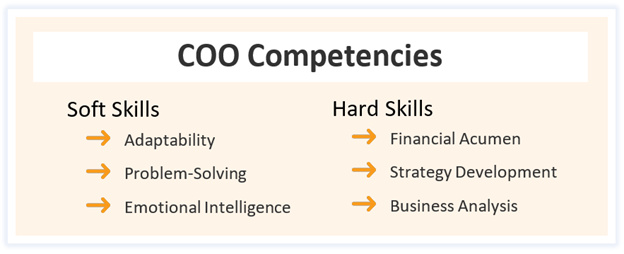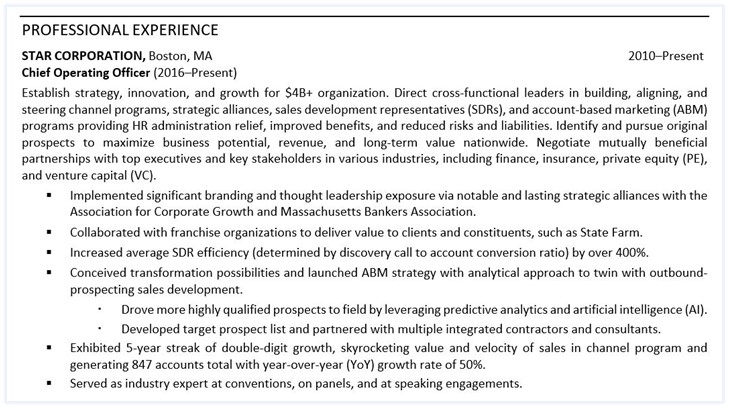Chief Operating Officer (COO) Resume Guide
Contents
Contents
Introduction
As a Chief Operating Officer, you are tasked with managing all the operational and administrative functions of your company. You need to think strategically and collaboratively in the development and execution of plans and policies.
The role of a COO is not set in stone, and many of the responsibilities are dependent on the industry and the company. Since the role is typically second-in-command, you must be able to exhibit not only your business acumen but also how you will complement and collaborate with the Chief Executive Officer.
The search for a COO position can be complex. You are up against an evolution in the C-suite, with Chief Financial Officers often taking on the responsibilities once defined as those of the COO. You’re up for the challenge and ready to embark on your next career-related adventure.
But what does it take to create a resume that will get you noticed?
Preparation and research along with the important strategies presented in this guide will enable you to get your resume through applicant tracking systems (ATS) and noticed by hiring managers. You may also want to consider whether you want to invest your valuable time writing an executive resume or whether you’d rather delegate the job to writing experts. If you decide you would rather take advantage of our executive resume writing service and use your time to expand your network and uncover new job opportunities, you can request a 1-on-1 consultation with one of our experienced team members.
The Big Picture
You’re at the top and that means there are fewer jobs to choose from. It doesn’t help that a wide-ranging study from the Journal of Management Accounting Research found that companies that handed over operational duties to their Chief Financial Officers saw no drop in performance. That means you really have to prove your worth.
But it’s not all bad news.
Instead of disappearing, the Chief Operating Officer’s role is changing to meet new business requirements. This new role includes leading regulatory, compliance, and governance efforts. Perhaps a wider-ranging expectation is that a Chief Operating Officer should be, above all else, a change agent. COOs need to have the vision to transform the way their companies operate and the ability to inspire others to take on transformative roles as well.
You know you have what it takes. Now you have to convince executive recruiters, human resources personnel, and the CEO.
In order to impress the decision makers, your resume must:
- Describe your vast talents and achievements in no more than two pages.
- Allow for easy visual scanning with plenty of white space and crisp organization.
- Feature an executive summary that sells your leadership style and expertise.
- Be free of any errors in content, grammar, spelling, or formatting.
Now, let’s explore each section of the COO resume in detail.
![]()
Let go of the notion that your resume is simply a listing of your previous jobs.
![]()
Layout and Design
While you want to stand out, an overly complex resume design isn’t the place to do it. It’s your talents that you want recruiters to remember, so resist the temptation to get too creative with your design.
Why do executive resume designs follow predictable patterns? Because those patterns work. Your goal is to make the job of reading your resume as easy as possible for busy recruiters. Look at it from their perspective. They are hired to find great candidates in short timeframes. Recruiters need to quickly scan your resume to confirm that you are a senior-level candidate they want to put forward for an interview.
Let your design echo your professional persona by developing an efficient, precise, and organized layout. Keep it simple. This will allow your achievements to stand on their own without overly flashy design. Skip the graphic distractions, and focus on a layout that demonstrates why you are the right person for the role. The best executive resumes follow these simple rules:
- Keep it impeccably organized with consistent spacing and alignment.
- Leave ample margins and vary line lengths to allow for white space.
- Create headings and job titles that stand out.
- Choose a legible font and use bold text sparingly.
Remember that unless you have a relationship with the recruiter or someone at the company at which you are applying, your resume is the first visual impression hiring professionals will get of you. Think about what qualities you want to project. They should be apparent in your design, so be neat, precise, and professional. Along those lines, don’t be tempted to include graphics or a portrait picture, and minimize the use of color. Let your achievements speak for themselves.
Now let’s look at the components of your resume.
Good Choices

Avoid These

Contact Information
To state the obvious, your contact information needs to be easy to find and simply listed at the top of your resume. In any case, it should stand out. If a recruiter has to hunt for your phone number, your resume is likely to land in the circular file.
When we say contact information, we mean:
- Your name
- Phone number
- Email (choose one only)
- LinkedIn URL.
Adding your city and state of residence is optional and you can decide whether it is relevant, but do not include your street address.
Your Title and Summary
Here, we are talking about the title of your resume, not your current job title. This should be the title of the job you want, not the job you have. Be careful here, because this is one small area that needs to be updated each time you apply for a new position.
When you apply, make sure your title matches the one on the job listing.
Now for the main section: your “summary.” We put it in quotes because it’s way more than a summary. You can also think of it as a professional profile, since it offers a glimpse at who you are as well as what you can do. Yes, you want to recount the highlights of your career, but more importantly, you want to convince decision makers that you are the right person to take over the Chief Operating Officer’s desk.
How do you do that in 3–5 sentences? First, you need to know what companies are looking for in a COO. Next, you need to take a hard look at your strengths and how to best portray them. A COO’s job is complex and requires excellent communication skills, that’s true, but you’re looking to demonstrate the high-level qualities that make a great Chief Operating Officer.
Which of these are your true strengths? Do you have others? Which can you demonstrate with concrete examples within your summary? You need to do more than say “Process-oriented COO who creates efficiencies.” You need to explain how and provide examples and quantifiable achievements.
Analyze the job description for the job you are applying for and make sure you use exact phrases from the listing in your resume. If the job listing says “profit and loss management,” don’t limit your language to just P & L. Spell it out. In fact, do both to increase your chances.
Along with your list of high-level talents, make a list of adjectives that describe your business style. If you’re unsure, ask a trusted colleague what words they would use to describe you. Since you will be working closely with the CEO, you need to offer some idea of your communication and working style.
Core Competencies / Skills and Accomplishments
Recruiters and hiring managers have an idea of the qualities and skills that make a great COO match for their company, and they want to quickly scan to see if you are a match. The more deliberate you are in your choices here, the better off you are.
One way to approach this is to brainstorm all your skills and attributes. Don’t hold back. Then sort your list into categories. Make one column for soft skills and one for hard skills. You can also add a column to document industry expertise.
Then, examine your list and choose a blend that illustrates your recipe for success as a COO. As a high-level executive, you are offering a bullet-point version of what you bring to the table.
Once you have honed your list of skills, ask yourself the following questions:
- Is my list weighted too heavily toward soft or hard skills?
- Have I chosen my highest-level skills? (Focus on abilities that help distinguish your candidacy.)
- Does this list give an accurate picture of who I am as a COO?
- Will my professional experience section offer details of the skills I have listed here?
Choose 6–10 soft skills and hard skills that best differentiate you and also meet the specified requirements of the job description.
Professional Experience
Your employment history is much more than a bulleted listing of your previous job responsibilities. Here, you want to show how you got where you are today by detailing how you contributed to the company in each of your roles.
Once again, make a list. This time, go through the past 10–15 years of your professional experience detailing what you achieved at each job and how you did it. What problems did you face and how did you solve them? How can you prove that your solutions achieved their goals? Use strong verbs to describe your actions and remember that the more detailed you are with data-driven evidence, the more valuable the information will be to recruiters and hiring managers. While you’re making your list, make sure you jot down your dates of employment, job titles, and the companies where you worked.
Add a short paragraph describing each of your roles, and then choose the achievements that back up your core competencies best and use a bullet for each achievement. Ask yourself the following questions:
- Do I have quantifiable evidence to back up my assertions?
- Do my achievements show the skills and experience the job requires?
- Can I demonstrate a pattern of growth in knowledge and responsibility?
- Am I leaving something in because it means something more to me than it will to a recruiter or future employer?
No need to repeat similar achievements within different job descriptions, and leave off any job you had more than 10–15 years ago unless it illustrates skills and experience you can’t demonstrate elsewhere. Remember to include your rapport with your current C-suite as an achievement; your prospective CEO will want to know you can get along with the boss. If you are finding this exercise is taking more time than you’d like to invest, you might consider hiring us to help.
Education and Awards
The most involved writing is behind you now. This section is a straightforward listing of your degrees. You have a bachelor’s degree in a business field. You might also have earned an MBA. All this section requires is the type of degree and the school you attended. You are a seasoned professional, so you are well past listing your GPA. Don’t neglect any additional certifications you have earned if they highlight knowledge that is essential to a COO.
If you have earned professional awards, you may add them here. Consider adding a separate section if space allows.
Finished Resume Example: Putting It All Together

You know how to consider the big picture and break it down into manageable action items. We’ve given you the action items. Now it’s time to evaluate the big picture. Examine our Chief Operating Officer example resume and consider how the parts fit together to convey a compelling career success story.
We just have a few more pointers:
- If your resume spans two pages, make sure you don’t split a section.
- Look over your resume for mistakes. Then, show your finished product to a trusted friend or colleague, someone who is great with words and as detail-oriented as you are. At the C-suite level, any mistake could derail your candidacy.
Now, put your work to the ultimate test by answering this question: Would you hire someone with this resume? The answer should be a resounding, Yes!
Next Steps
After reading this guide, have you calculated the time and effort it will take for you to do all this on your own? Do you want your resume to stand out from the crowd?
We invite you to request a free one-on-one consultation with one of our expert resume writers and let us help you get that interview.
How We Help Professionals Like You
We work exclusively with executive-level professionals like you. By leveraging our decades of experience and our proven process, our clients get hired faster and negotiate higher compensation packages. Our approach is to uncover your unique talent brand, the things that truly make you the best candidate for an executive position.
|
Resume Writing
|
||
|
Interview Prep
|
||
|
Career Coaching
|
The Power of a Professional Executive Resume
What does your personal brand say about you? Experienced executives leverage our team of certified resume writing experts to position them as the experts in their field.
You need more than just a resume; you will also need a cover letter, LinkedIn profile, and professional biography.
Here’s what our clients are saying about our process…
“I took some time last night to review the materials and some time this morning to re-review with fresh eyes. I cannot identify one edit that I would like to make. I appreciate the time we spent upfront to go through my background. I honestly believe it paid off big time. Those conversations pushed me in ways I really needed to be pushed and I am extremely grateful.”
– Executive Leader in Large Financial Firm
“I would like to personally say thank you for all of your efforts relating to the development of my resume and other collateral (cover letter, thank you notes, etc). It’s always a pleasure to meet someone like yourself [who] is so professional and who really exhibits awesome skills in really understanding the current landscape at the senior executive level. Your ability to ‘write the story’ and present the career lifeline in a way that the reader of these documents can follow and quickly ascertain key career successes and achievements was outstanding. I also appreciated the depth of our conversation and your knowledge from a business and industrial perspective as you pursued gaining a better understanding of me as we walked [through] the materials that I provided for your review. Your attention to detail was really outstanding, [as was] your ability to [dive deep into] several of the elements of my background. Your guidance and advice during the process was greatly appreciated and provided me with a strong sense that the end product was going to turn out very nicely. Again, thank you so much for your efforts and the final product — superbly done!”
– Chief Executive Officer and Founding Partner
Learn why 6,000+ executives have found success with us
If you would like to learn more about how we help our clients succeed in their careers, we invite you to request a 1-on-1 consultation with one of our team members.









